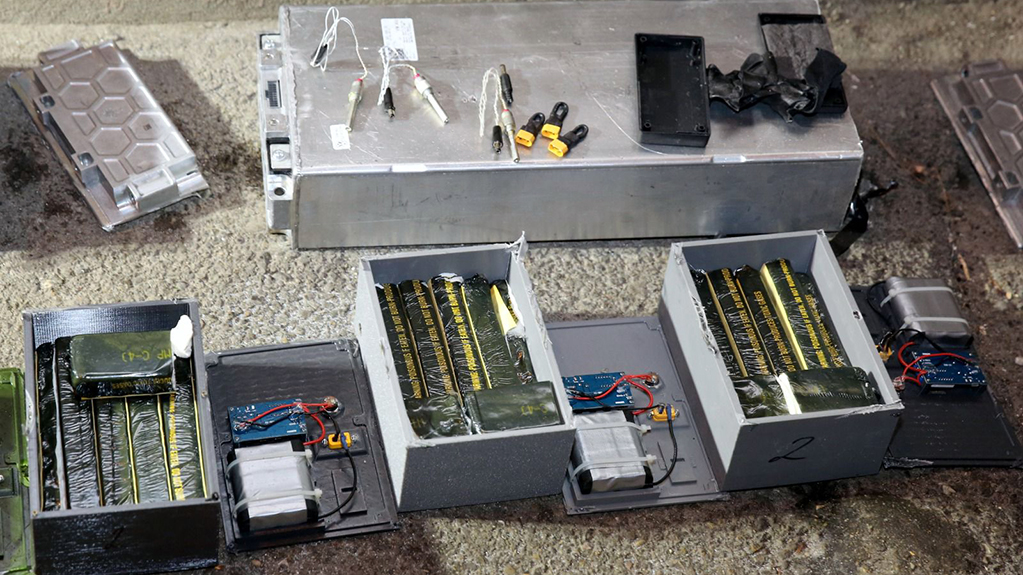State Security Service of Georgia (SSSG) reported on February 5, that the Counterterrorism Center successfully neutralized six special explosive devices and seized 14 kilograms of explosives. According to the Security Service, the cargo originated from Odesa, Ukraine, traversed Romania, Bulgaria, and Turkey, and entered Georgia on January 19 via the Sarpi checkpoint. The intended destination was the Russian Federation, specifically Voronezh, through the checkpoint Dariali.
News
Trending stories
- 1 Former Prime Minister Garibashvili Sentenced to Five Years in Prison After Plea Deal
- 2 Otar Partskhaladze Charged with Organizing Murder of Businessman Levan Jangveladze
- 3 Shalva Papuashvili Says Georgian Dream Filed Complaint with BBC
- 4 Georgian Dream Party Further Tightens Grants Law, Introducing Up to 6 Years in Prison
The probe revealed that the electric car accumulators were used as concealment containers.
“A specialized demining group removed the explosive devices and substances from the containers mentioned above. These items were subsequently sent to the Expert-Criminal Department of the Ministry of Internal Affairs for examination. To maintain confidentiality in ongoing investigative and operational activities, the containers were restored to their original visual appearance, resembling mock-ups, before being returned to their original packaging. This measure aimed to prevent disclosure of the secret investigative efforts to the intended recipients and executors.
The primary objective of the investigative actions was to identify the instigators and any additional individuals involved in transporting the mentioned cargo. Additionally, the investigative process sought to determine the movement route of the explosive devices and their ultimate intended use.
It has been established that the explosive devices contain military-grade plastic explosive C-4, activated by an electric detonator and a pre-programmed timer. Identical electronic activation timers were found in each of the six containers, specifying predetermined activation times.
Preliminary analysis indicated that all six devices were crafted by a highly skilled specialist and designed for a substantial radius of damage. Deploying such devices in densely populated areas could result in significant infrastructure damage and widespread casualties. The explosive substance in question possesses a considerably greater potency than TNT,” says Bacha Mgeladze, a director of the Counterterrorism Center.
Mgeladze reported that, following the initial decision to transport all six explosive devices to Russia, a subsequent order prompted a change. The second container, containing three explosive devices, was retained in Tbilisi, while the remainder of the shipment was intercepted by counter-terrorist center personnel in Kazbegi, near the Georgian-Russian state border.
The security service identified 7 Georgian citizens, 3 Ukrainian citizens, and 2 Armenian citizens involved in the transportation of explosive devices through Georgia, the subsequent movement across the country, and the intended transit to the Russian Federation.
The orchestrator of these activities, Andrei Sharashidze, originally coming from Batumi city, a citizen of Ukraine and a 2020 candidate for deputy in the Kyiv district of the local Rada from the “Servant of the People” party, was actively overseeing the movement of explosive devices from outside Georgia.
Mgeladze clarified that aside from Sharashidze, the other individuals involved were likely unaware of the explosive devices and capsule detonators concealed within the car batteries.
Regarding the three explosive devices left in Tbilisi, the head of the Counterterrorism Center believes that the extensive involvement of Georgian citizens and the use of Georgian territory served to create a misleading perception. This tactic aimed to associate Georgia with the planning and execution of potential terrorist acts, both within the country and abroad.
The investigation is being conducted under the third part of Article 236 of the Criminal Code, the illegal acquisition and storage of explosive substances and devices. The prescribed penalty for this crime ranges from three to six years of imprisonment. However, the State Security Service indicated that the charges may be revised, and the investigation will potentially proceed under Article 18-323, addressing the preparation of a terrorist act, with penalties ranging from ten to fifteen years of imprisonment.















